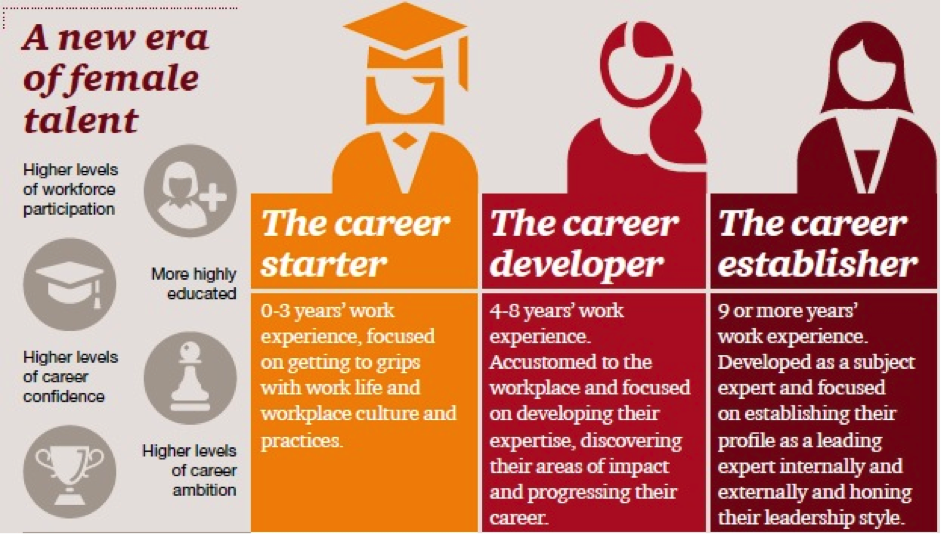 Sunday 8 March 2015 marks this year’s International Women’s Day. As we celebrate the achievements of women in the workforce and beyond, my advice for leaders of both sexes is to think broader than the top – you have a new era of female talent on your hands.
Sunday 8 March 2015 marks this year’s International Women’s Day. As we celebrate the achievements of women in the workforce and beyond, my advice for leaders of both sexes is to think broader than the top – you have a new era of female talent on your hands.
We believe that CEOs must be committed to driving parallel efforts that tackle enhanced leadership diversity in conjunction with systemic change efforts, targeting their workforce from day one here at PWC with the sponsorship of our Global Chairman, Dennis Nally, we are working hard to get this right.
We are focusing on developing talented junior women now, for future leadership roles, because when talent rises to the top, everyone wins
We are very passionate about this and so to mark International Women’s Day this year we are excited to launch our The female millennial: A new era of talent publication. This is a research-based report that shares the insights and desires of more than 10,000 millennials from 75 countries.
A new era of female talent
Our research tells us that when it comes to the female millennial (women born 1980–1995) we really are talking about a new era of female talent. Female millennials matter because they are more highly educated and are entering the workforce in larger numbers than any of their previous generations. They also enter the workforce with a different career mindset, they are more career-confident and ambitious than their previous generations.
Almost half of women kick-starting their careers feel they can rise to the very top levels with their current employer.
Forty-nine percent of female millennial career starters (0–3 years’ work experience) feel they can rise to the very top levels with their current employers, making them more career-confident than the generations that have gone before them. Despite this, there is still a confidence gap; 71% of their male peers feel the same way. This gap is something that must be recognised, but it is important we also look beyond just the gap.
Almost half of women kick-starting their careers feel they can rise to the very top levels with their current employer. Given only 4.8% of current Fortune 500 CEOs are female – an underwhelming historic high by the way – we must acknowledge and celebrate that the needle is moving when it comes to the career-confidence of female millennials.
Our research also tells us the female millennial ranks opportunities for career progression as the most attractive employer trait. It is also the most highly ranked reason female millennials have left a former employer.
But the millennial woman is not only more career-confident and ambitious than her previous generations. She is also more financially empowered. When it comes to earning power and patterns, millennial women are trailblazers. Our research tells us 86% of female millennials in a relationship are part of a dual-career couple. Furthermore, 42% earn equal salaries to their partner/spouse and 24% are the primary earner. This means 66% of female millennials earn equal to, or more than, their spouse. The more experienced the female millennial, the higher the likelihood she will be the primary earner. Our study tells us that 31% of female millennials with nine or more years’ experience are the primary earner in their relationship, compared to 18% of millennial career starters and 24% of career developers.
The female millennial sounds pretty amazing – right? But how can organisations capitalise on these stellar traits? To achieve a sustainable talent pipeline, employers can get things right by committing to inclusive cultures and talent strategies that lean into the confidence and ambition of the female millennial.
Themes that matter
The female millennial: A new era of talent report shares five key themes that matter to the female millennial and positions the difficult questions that employers need to be cognisant of when it comes to this growing and significant portion of the global talent pool. Diversity is front of mind for the female millennial. An employer’s reputation matters, global careers are high on the agenda and the female millennial desires work–life balance and flexibility combined with a strong feedback culture.
The female millennial career stage differential
Particularly interesting in this report is that we don’t just take a holistic view of the female millennial. I was very excited as a millennial woman to lead this project, but also recognised being a 34-year-old millennial woman with 14 years’ work experience that my experience will be very different from the experience of a 22-year-old millennial woman just starting out on her career. So we have created a female millennial career stage differential to help employers learn more about the female millennial.

As millennial women progress through this career stage differential, they are more likely to be in senior positions, more likely to have completed an international assignment, more likely to be the primary earner if part of a dual-career couple and more likely to value critical feedback discussions taking place face to face. On the flip side, they are also more likely to believe employers are too male-biased in terms of attraction, promotion, development and retention, and believe that taking advantage of work–life balance and flexibility programmes has negative career consequences at their workplace. They are also less likely to believe they can reach the very top levels with their current employer.
Female millennial role models in the plenty
While our research tells us that one-quarter of female millennials said they do not feel there are senior female role models that resonate with them at their current employer, one thing is clear – there are plenty of female millennial role models out there. From Australia to Brazil, Ghana to France, Ireland to Nigeria, Malaysia to Singapore, Spain to the UK and of course the US, you’ll find fantastic voice of the female millennial profiles to motivate and inspire you in our report.
Visit www.pwc.com/femalemillennial to download the report and access further resources for, or about, the female millennial.
 This Week’s Tip Is…
This Week’s Tip Is…



 Sunday 8 March 2015 marks this year’s
Sunday 8 March 2015 marks this year’s 
